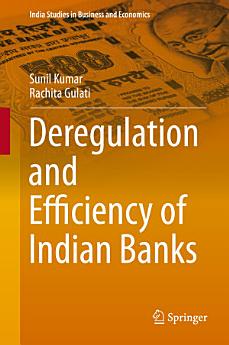Deregulation and Efficiency of Indian Banks
Sunil Kumar · Rachita Gulati
out. de 2013 · Springer Science & Business Media
4,0star
2 recensiónsreport
Libro electrónico
323
Páxinas
reportAs valoracións e as recensións non están verificadas Máis información
Acerca deste libro electrónico
The goal of this book is to assess the efficacy of India’s financial deregulation programme by analyzing the developments in cost efficiency and total factor productivity growth across different ownership types and size classes in the banking sector over the post-deregulation years. The work also gauges the impact of inclusion or exclusion of a proxy for non-traditional activities on the cost efficiency estimates for Indian banks, and ranking of distinct ownership groups. It also investigates the hitherto neglected aspect of the nature of returns-to-scale in the Indian banking industry. In addition, the work explores the key bank-specific factors that explain the inter-bank variations in efficiency and productivity growth. Overall, the empirical results of this work allow us to ascertain whether the gradualist approach to reforming the banking system in a developing economy like India has yielded the most significant policy goal of achieving efficiency and productivity gains. The authors believe that the findings of this book could give useful policy directions and suggestions to other developing economies that have embarked on a deregulation path or are contemplating doing so.
Valoracións e recensións
4,0
2 recensións
Acerca do autor
Dr. Sunil Kumar is currently serving as an Associate Professor of Economics at the Faculty of Economics, South Asian University (SAU), New Delhi. He is also associated with Punjab School of Economics, Guru Nanak Dev University, Amritsar. He has more than 20 years of teaching experience in subjects related to Quantitative Methods, Macroeconomics, and Econometrics. His research interests include data envelopment analysis, stochastic frontier analysis, banking efficiency and industrial productivity. He has published more than three dozen research papers in journals of national and international repute including Economic Change and Restructuring, Macroeconomics and Finance in Emerging Market Economies, the American Journal of Accounting and Finance, International Journal of Productivity and Performance Management, International Review of Economics, Benchmarking, Global Business Review, etc. He also wrote a research book entitled, “Productivity and Factor Substitution: Theory and Analysis”. His professional memberships include the Indian Society of Regional Science and Indian Economic Association.
Dr. Rachita Gulati is an Assistant Professor in Economics at Department of Humanities and Social Sciences, Indian Institute of Technology (IIT) Roorkee, Uttarakhand. Before joining IIT Roorkee, she was a core faculty of Indian Institute of Management (IIM) Kashipur, Uttarakhand. Her teaching interests include Applied Econometrics, Managerial Economics, and Quantitative Methods for Economists and her research interests include Efficiency and Productivity Analysis using Frontier Approaches and the Indian Banking Sector. Her research work focuses on financial economics in India and bears important policy implications for further reforms in the Indian banking sector. She has published research papers in journals of national and international repute. In 2008, she received the Best Paper Award from the Global Academy of Business and Economics Research (GABER), USA.
Dr. Rachita Gulati is an Assistant Professor in Economics at Department of Humanities and Social Sciences, Indian Institute of Technology (IIT) Roorkee, Uttarakhand. Before joining IIT Roorkee, she was a core faculty of Indian Institute of Management (IIM) Kashipur, Uttarakhand. Her teaching interests include Applied Econometrics, Managerial Economics, and Quantitative Methods for Economists and her research interests include Efficiency and Productivity Analysis using Frontier Approaches and the Indian Banking Sector. Her research work focuses on financial economics in India and bears important policy implications for further reforms in the Indian banking sector. She has published research papers in journals of national and international repute. In 2008, she received the Best Paper Award from the Global Academy of Business and Economics Research (GABER), USA.
Valora este libro electrónico
Dános a túa opinión.
Información de lectura
Smartphones e tabletas
Instala a aplicación Google Play Libros para Android e iPad/iPhone. Sincronízase automaticamente coa túa conta e permíteche ler contido en liña ou sen conexión desde calquera lugar.
Portátiles e ordenadores de escritorio
Podes escoitar os audiolibros comprados en Google Play a través do navegador web do ordenador.
Lectores de libros electrónicos e outros dispositivos
Para ler contido en dispositivos de tinta electrónica, como os lectores de libros electrónicos Kobo, é necesario descargar un ficheiro e transferilo ao dispositivo. Sigue as instrucións detalladas do Centro de Axuda para transferir ficheiros a lectores electrónicos admitidos.








